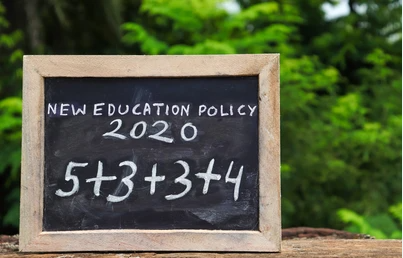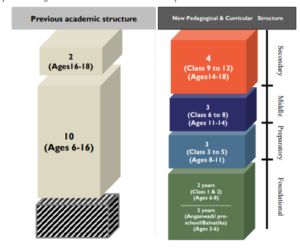
New Education Policy
The Ministry of Education paved a way of transformation by launching a New Education Policy(NEP) on 29th July 2020, this is the first education policy of the 21st century which is getting replaced after 34 years of the old policy.
The new NEP has 4 pillars which are Access, Equity, Quality and Accountability. It has a 5+3+3+4 years structure which consists of 12 years of school and 3 years of pre-school, replacing the old 10+2 year structure. The New Education Policy is trying to bring over 2 crore students into the mainstream, this policy aims on achieving 100% Gross Enrollment Ratio(GER) from pre-school to secondary by year 2030. This policy is looking forward to making India a ‘Global Knowledge Superpower’ and this can only be achieved by making the education system more flexible, approachable and multi-disciplinary which aims on bring out their unique capabilities.
The notable features of this policy are:-
5 years Fundamental
Std. Nursery @ 4 years
Std. Jr KG @ 5 years
Std. Sr KG @ 6 years
Std. 1st @ 7 years
Std. 2nd @ 8 years
3 Years Preparatory
Std. 3rd @ 9 years
Std. 4th @ 10 years
Std. 5th @ 11 years
3 Years Middle
Std. 6th @ 12 years
Std. 7th @ 13 years
Std. 8th @ 14 years
4 Years Secondary
Std. 9th @ 15 years
Std. 10th @ 16 years
Std. FYJC @ 17 years
Std. SYJC @ 18 years

Special and Important Points to be noted:-
Students now take a school examination which was conducted by the appropriate authority in grades 3, 5, and 8.
PARAKH (Performance assessment, review, and analysis of knowledge for holistic development) a new national assessment platform will be set up.
Mathematical thinking and scientific temper coding will start from class 6.
Till grade 5th this policy will emphasize local language/regional language/mother-tongue as the medium of instruction.
Schooling will be taught under the 5+3+3+4 formula.
3 years degree is for those students who do not want to take higher education. Whereas students pursuing higher education will have to do a 4 year degree. Students doing the 4 years degree will be able to do MA in one year.
Academic bank of credit (ABC) will be created in which digitally academic credit earned by students will be stored through different HEIs and it will be transferred and counted for final degree.
Students will be able to do other courses in between.
There will be same rules for all institutions, governments, private, deemed.
The new policy have been issued by order of Honorable Education Minister, Government of India.




